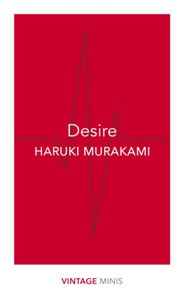Take a photo of a barcode or cover
mysterious
reflective
slow-paced
Plot or Character Driven:
Character
Strong character development:
Complicated
Loveable characters:
Complicated
Diverse cast of characters:
No
Flaws of characters a main focus:
Yes
reflective
fast-paced
The second bakery attack: ⭐️ 2/5
On seeing the 100% perfect girl etc etc: ⭐️ 2.5/5
Birthday girl: ⭐️ 3/5
Samsa in love: ⭐️ 4/5
A folklore for my generation: ⭐️ 4/5
this wasn’t the worst of him i’ve read, south of the border west of the sun still exists
hopeful
inspiring
mysterious
reflective
medium-paced
Plot or Character Driven:
Character
Strong character development:
Complicated
Loveable characters:
Complicated
Diverse cast of characters:
Yes
Flaws of characters a main focus:
Yes
slow-paced
Plot or Character Driven:
Character
Strong character development:
No
Loveable characters:
No
Diverse cast of characters:
No
Flaws of characters a main focus:
Yes
Desire by Murakami is a collection of bootless short stories, the central theme of which orbits around the concept of "human desire" in its various guises. The book, in all honesty, is a poor, deadening effort to capture the depths and vulnerability of humans and their desires of all and any kind. Centred around characters that neither seem to fascinate nor connect, the stories stumble from the start.
From the first story, The Second Bakery Attack, followed by On Seeing the 100% Perfect Girl One Beautiful April Morning, and The Birthday Girl, Murakami seemed persistent in failing both his stories and his characters, who quite frankly lacked any personality. However, the story that followed these - Samsa in Love set out rather interestingly, knowing the inspiration for the character, Gregor Samsa. The premise of this story convinced itself to be promising, eerie, yet something exciting seemed to await. And just as it takes its form, it only withers into what can best be described as a scornful imitation of a tribute, if it even intended to be one at all.
Desire is a beautiful feeling, an ache even, to yearn the unfulfilled, the eagerness to grasp and hold that which may never even grace you. Yet you long for it, it aches, but there's hope in that desire. It's beautiful. But Murakami not only dwindles in capturing the beauty or the pain of that desire, but also curtails it to something that borders on perversion. Disgusting. The last story doesn't hold anythign striking in particular either.
Overall, the stories proved to be purely ineffectual. Despite such a powerful concept, sadly, no element—be it the plot, the premise, thematic exploration, or the writing style — stood its ground to support the book's effectiveness. Murakami’s writing, though easy in its flow, simultaneously lacked depth and any real effort in these stories, rendering the book as a whole bland, shallow, and ultimately inept.
The only thing that prompted me to finish reading this book, despite my disappointment from the first story, was my genuine incompetency to DNF a book, and my unwavering commitment to being a well-informed hater.
From the first story, The Second Bakery Attack, followed by On Seeing the 100% Perfect Girl One Beautiful April Morning, and The Birthday Girl, Murakami seemed persistent in failing both his stories and his characters, who quite frankly lacked any personality. However, the story that followed these - Samsa in Love set out rather interestingly, knowing the inspiration for the character, Gregor Samsa. The premise of this story convinced itself to be promising, eerie, yet something exciting seemed to await. And just as it takes its form, it only withers into what can best be described as a scornful imitation of a tribute, if it even intended to be one at all.
Desire is a beautiful feeling, an ache even, to yearn the unfulfilled, the eagerness to grasp and hold that which may never even grace you. Yet you long for it, it aches, but there's hope in that desire. It's beautiful. But Murakami not only dwindles in capturing the beauty or the pain of that desire, but also curtails it to something that borders on perversion. Disgusting. The last story doesn't hold anythign striking in particular either.
Overall, the stories proved to be purely ineffectual. Despite such a powerful concept, sadly, no element—be it the plot, the premise, thematic exploration, or the writing style — stood its ground to support the book's effectiveness. Murakami’s writing, though easy in its flow, simultaneously lacked depth and any real effort in these stories, rendering the book as a whole bland, shallow, and ultimately inept.
The only thing that prompted me to finish reading this book, despite my disappointment from the first story, was my genuine incompetency to DNF a book, and my unwavering commitment to being a well-informed hater.
reflective
fast-paced
Plot or Character Driven:
A mix
Strong character development:
Complicated
Loveable characters:
Complicated
Diverse cast of characters:
No
Flaws of characters a main focus:
Complicated
I really liked the first story, but my enjoyment tapered off as the book continued
dark
emotional
mysterious
fast-paced
Plot or Character Driven:
A mix
Strong character development:
Complicated
Loveable characters:
Complicated
Diverse cast of characters:
Yes
Flaws of characters a main focus:
Yes
This read is for anyone who wants a strange page turner.
reflective
slow-paced
reflective
medium-paced
Plot or Character Driven:
A mix
Strong character development:
No
Loveable characters:
No
Diverse cast of characters:
N/A
Flaws of characters a main focus:
N/A









